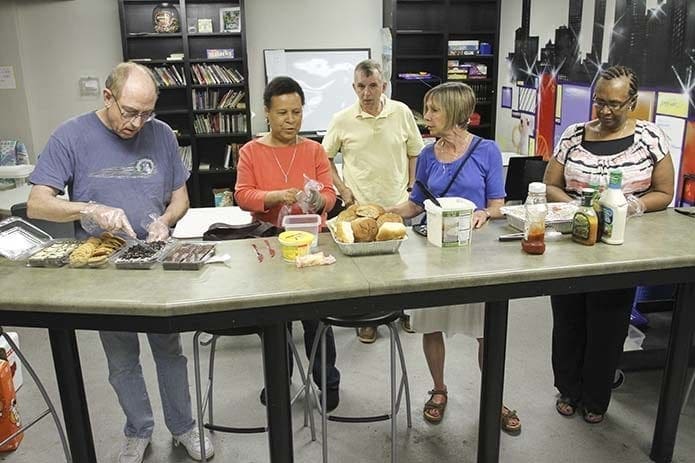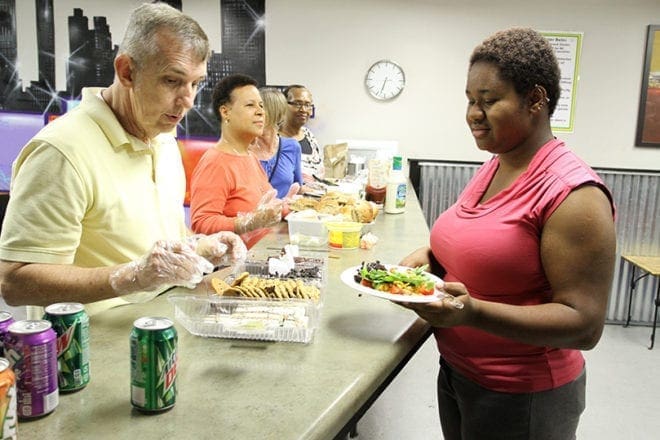 CNS Photo/Michael Alexander, The Georgia Bulletin
CNS Photo/Michael Alexander, The Georgia BulletinAtlanta
Parishioners Help Teens, Runaways Avoid Exploitation
By DENNIS SADOWSKI, CNS | Published August 2, 2012
Scanning the crowded terminal of the Greyhound bus station on the edge of downtown Atlanta, Breon Haskett hones in on a lone teenage girl standing in line waiting to buy her ride out of town.
Haskett, a tall, broad-shouldered Marine Corps vet who now works as the youth minister at Transfiguration Parish in suburban Marietta, mentions the girl to his partner on the Stand Up For Kids street team this evening, Michele Rothstein. The girl seems a bit uncertain about her surroundings. She checks her purse repeatedly, looks up at the clock on the wall near the glass-enclosed ticket window and fidgets with her travel bag.
Rothstein and Haskett approach the girl, easing into a conversation about why she’s in town and what help she might need. She says her name is Megan and she’s from Texas. She left home because she didn’t get along with her parents, and came to town looking for a roommate she connected with on the Internet. That didn’t work out so she’s headed to Dalton, 90 miles north.
Not wanting to pry, Haskett gently tries to learn more. But Megan doesn’t say much. She doesn’t offer how old she is. So Haskett hands her a purple plastic card with the toll-free phone number for Stand Up For Kids, which helps abused and runaway kids. It’s one of about a dozen cards Haskett and Rothstein hand out over their two-hour stint combing the streets for homeless young people.
“If you find yourself in a tough spot, call,” Haskett tells Megan. She thanks Rothstein and Haskett and they move on.
“Some roommate,” Haskett tells Rothstein once they are out of Megan’s earshot. He suspects the girl got into a bind and decided to leave town, that the roommate might have been a predator looking to sell her on the street for sex. She’s lucky to be able to leave, he says, but he worries about what she will run into wherever she’s headed.
Haskett and Rothstein are among the volunteers who spend one evening a week—a Monday or a Wednesday—on Atlanta’s streets.
Clad in matching purple T-shirts, Haskett and Rothstein follow a route that takes them to “Spaghetti Lot,” an asphalt parking lot nicknamed for the pasta often served to the homeless who congregate there at night; “Seven Bridges,” where a tent city under a confluence of interstate highways is home to dozens of people; Underground Atlanta, a well-known place for entertainment, shopping and dining; the Gateway Center shelter for homeless women and children; and Woodruff Park, a neatly manicured and treed six-acre plot of green space popular among office workers on weekdays.
For Haskett, 46, seeking homeless teens and young adults is a race against time.
“Forty-eight hours, unfortunately, is about how long the kids will be on the street before they run into a situation where they’re going to have to do what we call ‘rescue sex’ or maybe sex for food,” Haskett explained in an interview with Catholic News Service. “We try to find kids who are fresh to the area so we can avoid them having to go to those extremes for their needs.”
The volunteers carry hygiene and food packs that they give to newfound homeless kids in an effort to stave off perpetrators who use their street smarts to lure kids into the commercial sex trade by offering basic necessities or even drugs and alcohol.

Twenty-year-old Latisha Burrell, right, goes through the food line as Our Lady of Lourdes Church parish volunteer Ron Chandonia offers her a selection of cookies. Photo By Michael Alexander
The work of Haskett and Rothstein is part of Atlanta’s unified and growing campaign involving churches, social service programs, nonprofit groups and government agencies to fight the commercial sexual exploitation of children, or CSEC. The FBI considers Atlanta a major CSEC hub, one of 14 in the country.
Founded in 1990, Stand Up For Kids is run almost entirely by volunteers. With headquarters in Atlanta, it now reaches into 38 cities. Its programs assist young people 14 through 22 years old.
The Atlanta site operates an outreach center that is open two nights a week. It’s a place where young people can get a hot meal, shower, do their laundry, pick up new clothes, check email and phone messages, get help obtaining an identification card, undergo GED training, receive tutoring for class work if they are still in school, search for employment and learn parenting skills to help raise children of their own.
Several members of Our Lady of Lourdes Parish in Atlanta are among the volunteers who prepare a meal once a month. Parishioners also are involved in the center’s programs.
“We do it because there are people in need, very vulnerable people. Even though we’re downtown, I don’t think we realized how many people were involved (in being sexually exploited),” said Ron Chandonia, chairman of the parish’s life issues committee.
“One of those vulnerable points is where people are at risk, people on the streets who don’t know where their next meal is to come from and where they are going to sleep or somebody is enticing them to get involved in sexual trafficking,” he added. “That’s a life issue.”
Julie Binney, a volunteer from Transfiguration Parish and a retired teacher who runs GED classes at the center, has found that almost all of the young people taking advantage of the outreach center’s services come from families with serious challenges: drug or alcohol abuse, physical abuse, crime, or long-term unemployment. Many of the young people have criminal records themselves, she said.
Volunteers are careful not to take on a parental role though, Binney explained.
“We’re in more of a mentoring role, much more so than as a parent. We don’t really want to take a parent-child relationship with these kids because they’re pretty proficient in surviving on the streets. They are not going to be like our kids,” she told CNS.
Since beginning to make the rounds on the street two years ago, Deacon Phil Miles, Transfiguration’s finance director, said many of the homeless young people have come to recognize him and his fellow volunteers as supporters and advocates. In a sense, he says, they have become friends.
“You always think I’m going to go down there to help and you wind up getting so much more yourself,” he said. ‘It’s always a surprise to me when I come back and I’m just feeling so spiritual because I’ve met people who are close to Christ even though they have no money, no possessions.”